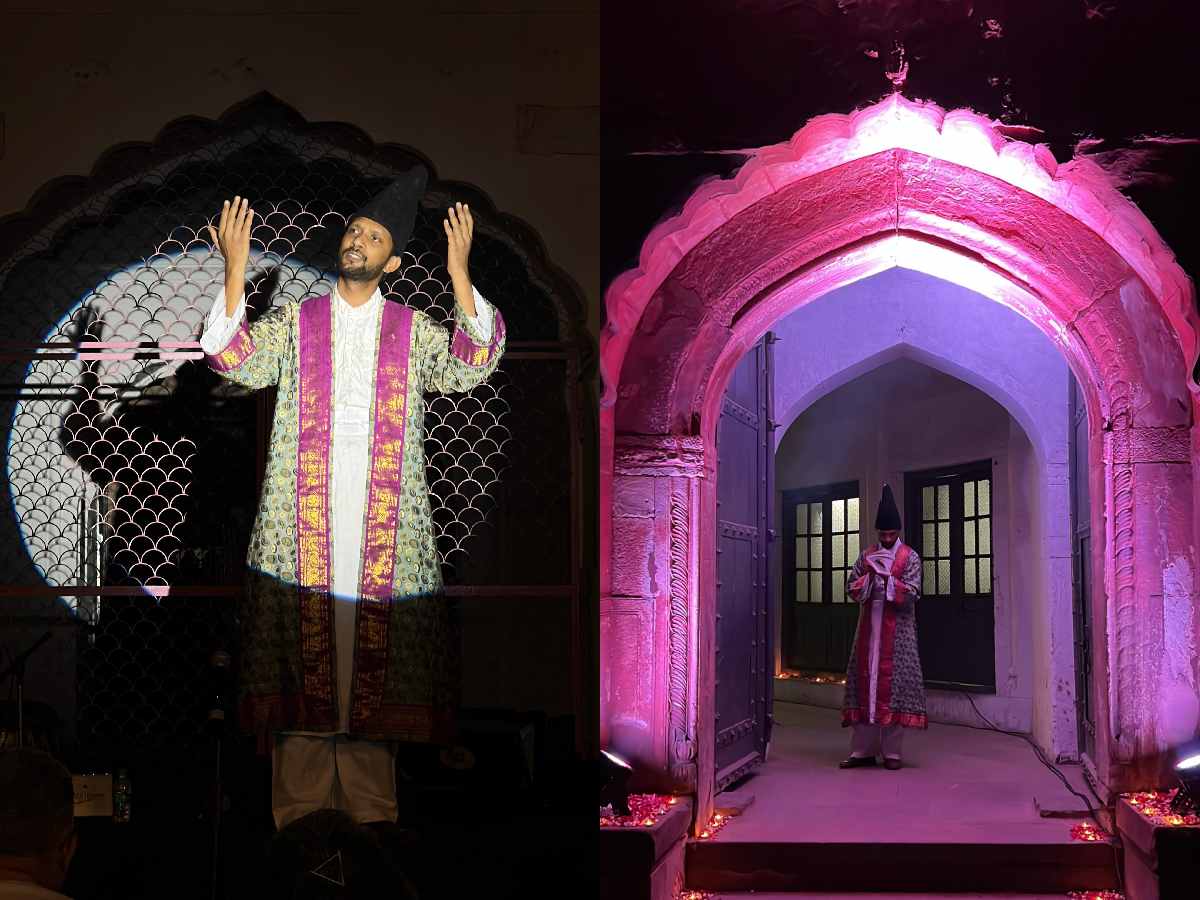
Shariq, dressed as Ghalib, performs and welcomes visitors at the Anglo Arabic School.
The UNESCO World Heritage Week in Delhi offered a lively celebration of the city’s rich history and culture. Organised by the Kiran Nadar Museum of Arts in collaboration with Tales of City, the five-day festival (November 20 to 24) of heritage walks brought together history enthusiasts, culture buffs, and curious participants eager to explore Delhi’s multifaceted past. The festival culminated in a grand closing ceremony at the Anglo Arabic School at Ajmeri Gate, a fitting venue that embodies Delhi’s educational heritage.
A glimpse into the walks
The festival began with “Sufi Souls and Qawwali Echoes” at Chirag Dilli. Led by historian Rana Safvi, the walk explored the life and teachings of Hazrat Chiragh-e-Delhi, one of the city’s revered Sufi saints. Participants were immersed in the spirituality of the shrine, learning how Sufism has influenced communal harmony and the cultural fabric of Delhi.
Day two brought stories of Mughal matriarchs to life at Humayun’s Tomb, with author Ira Mukhoty shedding light on the often-overlooked roles of Mughal women in shaping the empire. The walk unveiled tales of strength, resilience, and influence, offering a nuanced understanding of the era’s power dynamics.
On the third day, the focus shifted to architecture, with walks like “Stein-a-bad” and “Delhi’s Modernist Skyline” examining Delhi’s evolution from colonial times to modernity. Led by architects Intekhab Alam, Rafiq Kidwai, and Ashish Karode, these walks showcased how modernist designs blended with traditional Indian elements to create a unique architectural identity for the city.
Also Read: Delhi: Why North and South blocks may fade, but their legacy won’t
Day four featured historical narratives. Swapna Liddle’s “From Colony to Republic” walk explored New Delhi’s transition during the freedom struggle, while Suhail Hashmi’s “Buried in History” uncovered the architectural and historical significance of the Sultan-e-Garhi tomb, one of Delhi’s oldest surviving structures.
A poetic finale
The festival’s final day was dedicated to Old Delhi, with the walk “mīr’ o ‘ġhālib’ kī dillī” leading participants through the world of poets in the historic lanes of Ballimaran. Guided by legal expert and history enthusiast Chandrashekhar Tampi, the walk drew at least 30 attendees, including artists, social workers, and groups of friends.
Starting at Ballimaran, Tampi introduced participants to the iconic Chandni Chowk, explaining its historic significance. “Chandni Chowk is exactly one mile long—that’s 1.6 km,” he shared, before narrating the linguistic origins of Urdu, derived from the word Ardu, meaning camp.
The next stop was Ghalib’s Haveli, where attendees were met with a delightful surprise: a man dressed as Mirza Ghalib, reciting the poet’s lines with theatrical flair. Drawing laughter and applause, the skit brought Ghalib’s life to the forefront, highlighting his humour, hardships, personal losses, and biting sarcasm.
Tampi then compared the lives and linguistic styles of Ghalib and Mir Taqi Mir, explaining how Persian influenced their work and reflecting on the socio-economic conditions of their time. The attendees, clutching gajras and wearing badges from Tales of City, traversed Ballimaran’s lanes to explore Ahata Kale Sahab, Habshi Halwa shops, and the ruins of Ahsan Ullah Khan’s haveli.
The walk also highlighted lesser-known historical sites, such as Masjid Mubarak Begum, notable for being patronised by a courtesan during the Mughal era.
Closing at Anglo Arabic School
The final stop was the Anglo Arabic School at Ajmeri Gate, where a skit depicted Ghalib applying for a position at the Dilli College, the institution’s former name. The school’s historic ambience provided the perfect backdrop for the closing ceremony.
The evening featured musical performances from Rene Singh and Lokesh Jain, whose soulful renditions echoed through the premises. The dim lighting, majestic gates, and historic mosque adjacent to the school added to the charm. Guests enjoyed a sumptuous dinner, ending the event on a high note.
The organisers’ reflections
Shagufta, an official from Tales of City, expressed her delight with the festival’s success. “Almost all the tickets were sold. We managed to curate every walk on time, except the first day, which was delayed due to air pollution. The feedback has been amazing. We visited diverse locations like Chunnimal Haveli, and everything went as per expectations,” she said. Founder of the Tales of City, Abu Sufiyan noted that the first walk, which was supposed to be led by William Dalrymple, was put on hold due to severe pollution in the city.
The festival saw a mix of participants, from seasoned walkers to first-timers. Avinash Kaur, one of the attendees, called the walk “an absolute win.” She added, “I’ve attended many walks before, but this one stood out because of the level of detail shared. I gained a deeper understanding of the history behind the havelis and other sites.”
A group of friends, including social worker Pooja Dhingra, cinematographer Emily Flower, and artist Lia, also shared their experiences. “I loved how Mr Tampi described everything in such detail. It was my first heritage walk, and it was amazing,” said Emily. Pooja added, “The performances were soulful, and the food was fantastic.” Lia, beaming, said she fell in love with the city through the lens of Chandrashekhar Tampi.
Through its carefully curated walks, the festival not only celebrated Delhi’s UNESCO World Heritage sites but also ignited a deeper appreciation for the city’s rich, layered history. By blending storytelling, cultural performances, and immersive experiences, it successfully brought Delhi’s soul to life, leaving attendees with cherished memories and a renewed connection to their heritage.
Delhi Police will deploy over 15,000 personnel across the city during Holi, with intensified patrols…
A Delhi canteen owner was allegedly murdered and dismembered by his friend and accomplices for…
A 21-year-old man has been arrested for allegedly stabbing two teenage brothers at a Haiderpur…
Droupadi Murmu launches Pink National Common Mobility Card, free LPG cylinder benefit, and two financial…
Court says detention unnecessary, cites liberty concerns in AI summit protest case
Indian airlines cancelled 760 overseas flights in the last two days owing to the escalating…